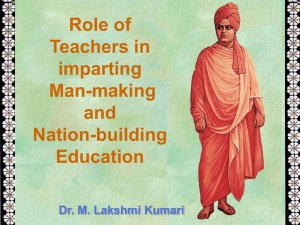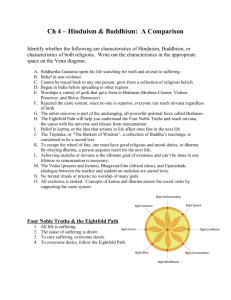The Thematic Units
advertisement
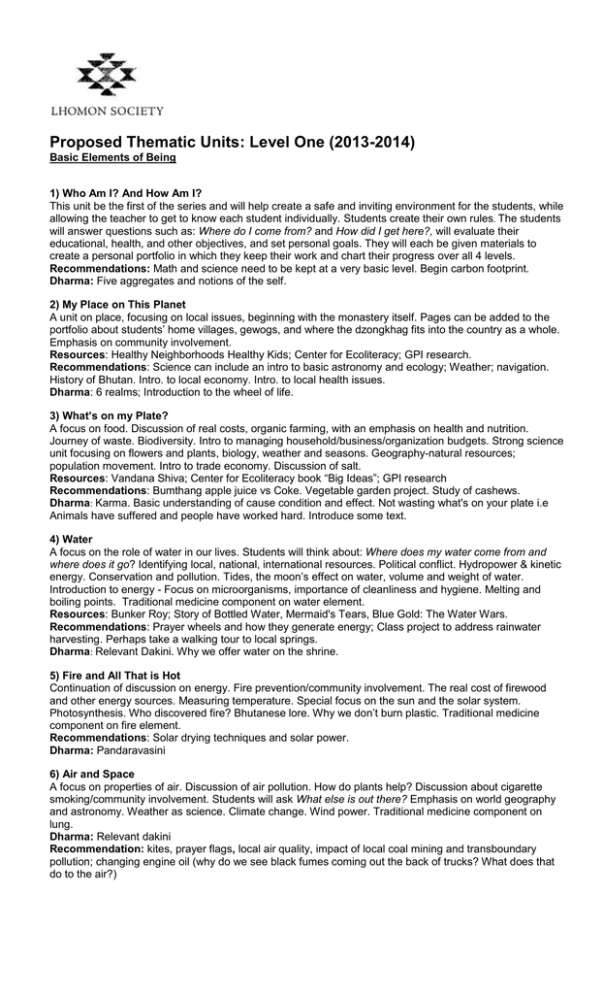
Proposed Thematic Units: Level One (2013-2014) Basic Elements of Being 1) Who Am I? And How Am I? This unit be the first of the series and will help create a safe and inviting environment for the students, while allowing the teacher to get to know each student individually. Students create their own rules. The students will answer questions such as: Where do I come from? and How did I get here?, will evaluate their educational, health, and other objectives, and set personal goals. They will each be given materials to create a personal portfolio in which they keep their work and chart their progress over all 4 levels. Recommendations: Math and science need to be kept at a very basic level. Begin carbon footprint. Dharma: Five aggregates and notions of the self. 2) My Place on This Planet A unit on place, focusing on local issues, beginning with the monastery itself. Pages can be added to the portfolio about students’ home villages, gewogs, and where the dzongkhag fits into the country as a whole. Emphasis on community involvement. Resources: Healthy Neighborhoods Healthy Kids; Center for Ecoliteracy; GPI research. Recommendations: Science can include an intro to basic astronomy and ecology; Weather; navigation. History of Bhutan. Intro. to local economy. Intro. to local health issues. Dharma: 6 realms; Introduction to the wheel of life. 3) What’s on my Plate? A focus on food. Discussion of real costs, organic farming, with an emphasis on health and nutrition. Journey of waste. Biodiversity. Intro to managing household/business/organization budgets. Strong science unit focusing on flowers and plants, biology, weather and seasons. Geography-natural resources; population movement. Intro to trade economy. Discussion of salt. Resources: Vandana Shiva; Center for Ecoliteracy book “Big Ideas”; GPI research Recommendations: Bumthang apple juice vs Coke. Vegetable garden project. Study of cashews. Dharma: Karma. Basic understanding of cause condition and effect. Not wasting what's on your plate i.e Animals have suffered and people have worked hard. Introduce some text. 4) Water A focus on the role of water in our lives. Students will think about: Where does my water come from and where does it go? Identifying local, national, international resources. Political conflict. Hydropower & kinetic energy. Conservation and pollution. Tides, the moon’s effect on water, volume and weight of water. Introduction to energy - Focus on microorganisms, importance of cleanliness and hygiene. Melting and boiling points. Traditional medicine component on water element. Resources: Bunker Roy; Story of Bottled Water, Mermaid's Tears, Blue Gold: The Water Wars. Recommendations: Prayer wheels and how they generate energy; Class project to address rainwater harvesting. Perhaps take a walking tour to local springs. Dharma: Relevant Dakini. Why we offer water on the shrine. 5) Fire and All That is Hot Continuation of discussion on energy. Fire prevention/community involvement. The real cost of firewood and other energy sources. Measuring temperature. Special focus on the sun and the solar system. Photosynthesis. Who discovered fire? Bhutanese lore. Why we don’t burn plastic. Traditional medicine component on fire element. Recommendations: Solar drying techniques and solar power. Dharma: Pandaravasini 6) Air and Space A focus on properties of air. Discussion of air pollution. How do plants help? Discussion about cigarette smoking/community involvement. Students will ask What else is out there? Emphasis on world geography and astronomy. Weather as science. Climate change. Wind power. Traditional medicine component on lung. Dharma: Relevant dakini Recommendation: kites, prayer flags, local air quality, impact of local coal mining and transboundary pollution; changing engine oil (why do we see black fumes coming out the back of trucks? What does that do to the air?) Proposed Thematic Units: Level Two (2014-2015) What Moves Us, What Binds Us 1) Earth and Its Systems Looking at planet earth: This place we live. Geosphere/biosphere. Earth systems. Interdependence. Interaction of solar and lunar cycles. Personal responsibility, our role in this system. Class project around zero waste: Reduce, Reuse, Recycle. Working with local government to affect change. Vegetable gardening and Composting. Population. Gravity. Resources: Mini Earth (video), Thanal materials Recommendations: Look at local mining Dharma: Relevant dakini, holy places, pure lands 2) Trade and Globalization Students will start by looking at what they are wearing: Where did you get that shirt? Discussion of economics, fair trade, real costs, economic interdependence, intro to GNH vs GDP. Environmental impacts of trade and economic activity (acid rain, weather, global warming) Resources: Story of Stuff, Economics of Happiness, Center for Ecoliteracy materials, Happy Planet Index. Recommendations: Math - Data handling and statistical investigation, projection, percentages, ratio and proportion. Dharma: Karma and Renunciation 3) Change/Innovation How things work. Developing creative thinking skills. Necessity is the mother of invention. History (the wheel, the car, the Internet). Solar engineering. Recommendation: Field trip to JNP and new Centre for Appropriate Technology Dharma: Impermanence on a more subtle level. 4) Radio/Media Literacy Developing writing and communication skills. Sharing information and stories. Setting up a web site for the monastery. Blogging. Interviewing local people local histories. How does a camera work? Television? Resources: Happy Planet Index, Ecological Footprint sites Recommendations: How does radio work? Data handling and statistics Dharma: Bodhicitta 5) What Do I Believe and Why? A unit on world religions and philosophy. Different astrological systems (Chinese, Zodiac, Tibetan) and medicinal studies (allopathic, Chinese, Traditional Bhutanese). Resources: Professor Samdrong Rinpoche’s booklet on world religions. Vandana Shiva. Recommendations: For math element consider using population studies, timelines (BCE, CE) Dharma: Buddhist Logic: come and see not come and join. Analyzing of the guru. 6) Gross National Happiness What is GNH, what are its values, principles, and practices, and how can Bhutan be a model for the rest of the world? Personal responsibility. Projects that can make a difference. Community involvement, political systems, social justice, civic norms, real cost. Dharma: 7 sublime noble wealth Levels Three & Four (2015-1017) The themes for classes in the third and fourth year will remain unspecified at present so that the teachers and students can decide among themselves what themes they are interested in pursuing. These are just some ideas. The Essences 1) Salt 2) Phosphorous 3) Secrets 4) Greed & Gratification 5) Heroes 6) Invisible World Moving Forward 1) The Journey 2) Awareness 3) Balance 4) Media Literacy lI 5) Origin of Language Dharma curriculum development team Drubgyud Tenzin Rinpoche Lama Sonam Phuntsho Khenpo Sonam Tashi Wyatt Arnold Pema Longdrol Pawo Choyning Dorji Alex Trisoglio Greg Forgues Note: Resources and recommendations listed above are intended to be illustrative only, and are by no means comprehensive.
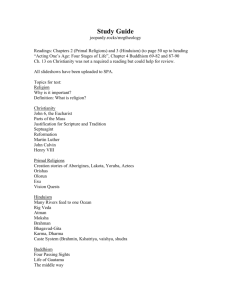
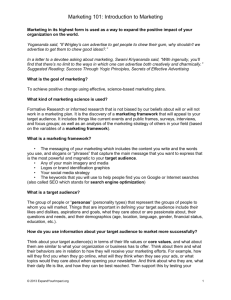
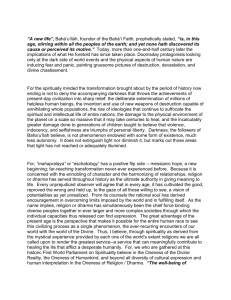
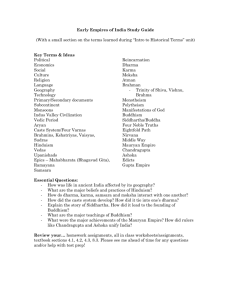
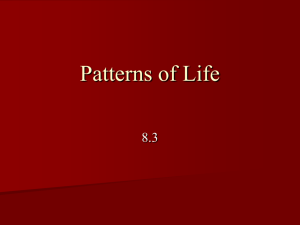
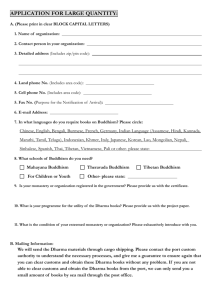
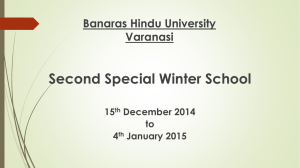
![[#SEAD-614] Create Project Space for Moore Lab Group](http://s3.studylib.net/store/data/007834021_2-e246955aacca9cfb92a906a1234e44a5-300x300.png)
